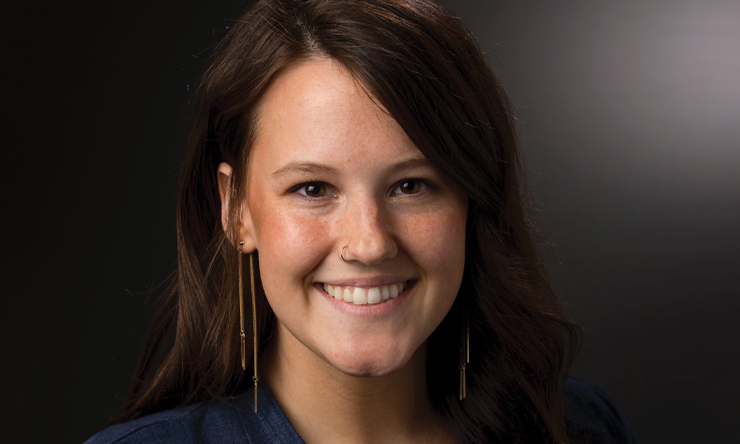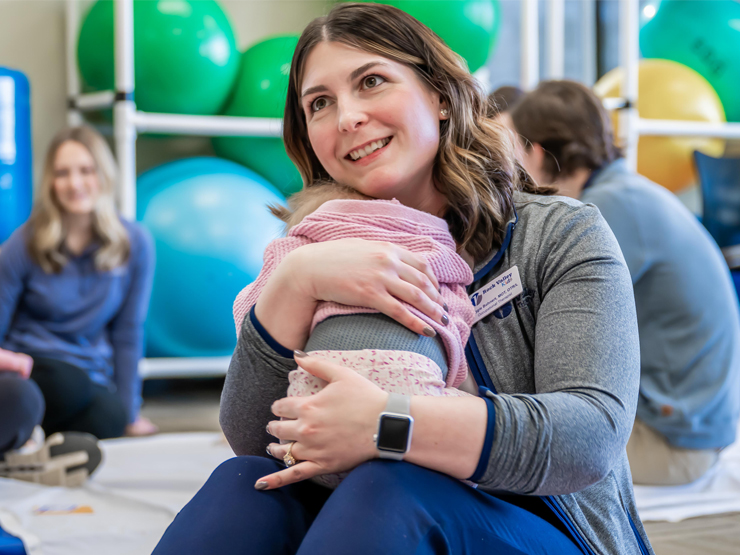Jena Benik will concede she is "a planner."
More than seven years ago, the Dallas suburbanite set her sights on becoming a physician assistant. A former software salesperson with a University of Illinois business degree, Benik began her quest by taking the undergraduate science courses required for consideration for entry into a Master of Physician Assistant Studies program.
A few years later, she began working as a medical assistant to collect the hundreds of official observation hours also needed for admission to an MPAS program. She spent another two years applying to schools throughout the country.
"My husband asked me recently, ‘Did you know when you started this it would take 10 years?'" she said. "He was thinking 18 months and I would be done. And I said, ‘Oh no. I knew it would be 10 years.'"
Still, even the world's most forward-thinking and well-organized planner never could have plotted this well.
In mid-June, the 45-year-old Benik joined 29 fellow members of the inaugural St. Ambrose University MPAS cohort for the start of their 29-month progression toward potential careers in one of the fastest-growing professions in the medical industry.
For Benik, the educational beginning of a new vocation comes just a few miles from her native Orion, Ill., and includes guest-house accommodations next door to her parents' new home in Hampton, Ill.
She will be pursuing her MPAS degree through the SAU College of Health and Human Services, which in the span of a quarter of a century has grown into one of the most highly regarded educators of healthcare professionals in the Midwest.
"It's funny because my mother sent me the clipping from the local paper the moment this program was announced," Benik said, conceding to a touch of serendipity infiltrating her long-term plan. "I visited when the program was in its infancy. Every time I came back, I would drop in and see where they were in the planning."
Life-long Learning Haven
Serendipity aside, it is no coincidence that Benik, a mother of a grade-school daughter, is one of eight adult learners in the initial MPAS cohort.
Given their rigorous admissions requirements and complex demands for continuing, post-graduate education, the health sciences are a compelling and logical option for adults committed to life-long learning. And that is truer in the digital age than it ever has been, said Sandra Cassady, PT, PhD, dean of the College of Health and Human Services.
"There has been this information explosion," she noted. "And to keep up, to remain current in these fields, life-long learning is not an option. It is required."
Boosted in part by a professional population committed to always learning more, CHHS programs are vital, thriving components of the St. Ambrose University academic menu.
The MPAS department will occupy a significant portion of the recently completed 13,000-square-foot addition to the university's Center for Health Sciences Education at Genesis. The MPAS is among several advanced degree programs offered by the CHHS.
It joins the Doctor of Physical Therapy program as well as master's programs in occupational therapy, speech-language pathology, social work, education in teaching and educational administration.
CHHS graduate programs accounted for more than 40 percent of graduate student enrollment at St. Ambrose in 2013-14, and that number will certainly increase as the MPAS program grows. St. Ambrose fielded 300 applications for the initial 30-student MPAS cohort that reported in June. Program Director Clare Kennedy, MPAS, PA-C, said 80 applications were received in the first month of the seven-month application cycle for the 2015-16 academic year, which closes on Nov. 1.
St. Ambrose's role in health sciences education began decades ago, when nursing students at the former Mercy Hospital earned science credits through the college. It gained momentum in the late 1980s after a consortium of QC hospitals asked the university to help prepare occupational therapists and physical therapists in order to fill a growing number of vacancies in those fields. The OT program was introduced in 1989, and the Master of Occupational Therapy degree was added in 1998. A Master of Physical Therapy program debuted in 1993, and was converted to a doctoral program in 2002.
Cassady said the CHHS grew under the visionary guidance of Edward Rogalski, PhD, SAU's president emeritus, along with former Provost Don Moeller and Daniel Bozik, who was dean of what was then the College of Human Services.
The CHHS continues to grow partly through the interest of adult learners looking for new careers and more fulfilling missions in life.
This includes current DPT student Marty Barclay, a former operatic performer and college vocal instructor who sees his future work with therapy clients as interestingly similar to the individual voice instruction he gave not long ago.
"Didactically, there is a difference," said the married father of three. "What you need to know to do each discipline effectively is different. But the voice student and therapy patient both come to you with an issue they want to improve or correct. You talk with them, then set a plan and follow it."
Julie Jones '03 MOT was 38 and a mother of two when she turned to occupational therapy as a means of expanding on work she had done with students with disabilities as a grade school paraprofessional.
"I think the best thing that came out of it was my kids became better students because I was studying all the time," said Jones, who today is a pediatric occupational therapist and an adjunct instructor in the SAU MOT department. She also is pursuing her doctorate in occupational therapy online.
"You could say it promotes it," she said of the connection between health sciences and continual learning. "I would say it demands it."
A Chance to Heal
Projected by the US Bureau of Labor Statistics to be among the 30 fastest-growing jobs for 2016, the physician assistant profession is a particularly appealing career option for the perpetually curious adult driven to do more in life.
"First of all, it is a field that is becoming much better known," Cassady said. "It wouldn't surprise me if some of these students didn't even know about the PA profession when they were in college. They either have become more aware as an adult learner, or they are pursuing this at a better time in their lives."
All of the above is true in the case of Benik, who turned away from her initial interest in biochemistry as an undergrad due to the cost of an advanced degree. "I switched to business out of practicality," she said.
Her 11-year career in software sales included three years working with her husband, Joe, in Dublin, Ireland. When she later took three years off from work following the birth of their daughter Kate, Benik already had begun the process of planning for a career in health care.
She started with a part-time position as a pharmacist's assistant, and that is where she discovered a direction for her future.
"I remember at 9 o'clock one night, I was typing in a prescription from a PA and it just kind of clicked in my head," she said. "I wanted to know more about this profession."
Benik quickly discovered the PA role was a natural fit for her desire to help an aging population as it navigates the increasingly complex healthcare system.
"I have this really unusual connection with older adults," she said. "And I can see how important it is going to be for someone not just with scientific knowledge but also people skills to be there to help them down the path they are going to be traveling."
Cassie Schills is a few years younger at age 28, but she is a non-traditional MPAS student nonetheless. She considered physical therapy following her undergrad career but wanted a broader involvement with patients.
"I realized PA was where I could use my energy and my love of medicine to really make an impact," she said.
Although other programs have been established longer, Benik and Schills said the opportunity to be a member of the initial St. Ambrose MPAS cohort is exciting. Plus, said Schills, "Knowing people who had gone through the DPT and MOT programs there, I was extremely confident in what St. Ambrose could produce."
Program Director Kennedy became a physician assistant after first working in the insurance business. She promised the SAU program will be rigorous and challenging. "It will be the hardest thing they ever do in their lives," she said. "Anybody who has graduated from PA school will tell you the same thing."
Benik is planning on being tested. And Schills is glad to know she will be in the company of classmates committed to a lifetime of learning.
"I am a firm believer that you never stop learning," she said. "With the PA program and any other high-level program like that, you surround yourself with others who feel the same way. And that motivates you to want to learn even more."
News
Share This Story



